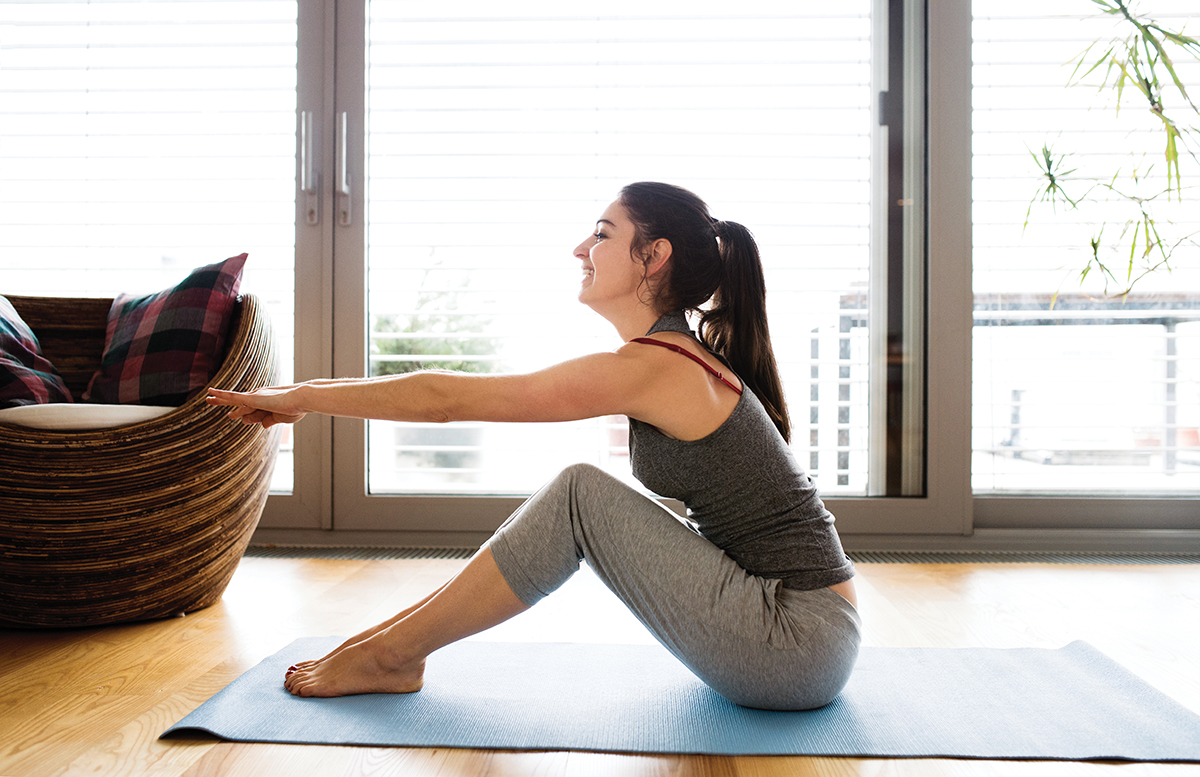It’s not uncommon for new mothers to experience worry, fatigue, and sadness for a few weeks after giving birth, what’s often called the baby blues. But up to 15 percent of new moms will develop postpartum depression, a mood disorder characterized by more extreme feelings of anxiety and unhappiness. Left untreated, postpartum depression can prove unhealthy or even dangerous for a mother as well as her new baby.

“After a baby is born, there are so many stressors in a woman’s life,” says Beth Lewis, professor and director of the School of Kinesiology. “And if the mom isn’t taking care of herself, then she can’t take care of her baby.”
Lewis studies motivational interventions for physical activity and the relationship between exercise and mental health, much of it carried out through the school’s Exercise and Mental Health Lab. Her research examines how non-face-to-face behavioral interventions can promote physical activity among sedentary adults and make physical activity a part of everyday life.
Some of Lewis’s leading research has focused on the role of exercise in preventing postpartum depression. So far, she has led three large intervention trials focused on it.
In 2012, Lewis received a $1.46 million grant from the National Institute of Mental Health for a study that ended in 2017. She and her team recruited postpartum women with a history of depression and randomly placed them in three groups. One group got a six-month phone-based exercise intervention program, another received phone-based intervention focused on wellness but not exercise, and a third continued their usual lifestyle and care with no intervention.
Preliminary results at six months indicated that women in the wellness intervention program reported lower depressive symptoms than participants in the usual care group. And women in the exercise intervention program reported lower stress levels than either of the other two groups.
In 2014, Lewis published results from a different study that placed participating women into two groups, both exercising about 125 minutes a week. An estimated 30 to 40 percent would have been expected to develop postpartum depression without any intervention given all participants either had a family or personal history of depression. But after the six-month program, in both groups, they found that only 8 percent of the women experienced postpartum depression.
“Exercise is one of the best things a person can do in terms of prevention for medical and mental health issues,” Lewis says. “We know that exercise is helpful for depression in general. Research has shown that it’s just as effective as antidepressant medications—if you can get people to exercise.”
As Lewis wrapped up the 2012 study last summer, she started recruiting participants for new research on postpartum depression prevention that will begin during pregnancy and continue through the postpartum phase.
“Exercise is one of the best things a person can do in terms of prevention.”
She’s actively seeking more low-income participants and offering bilingual intervention services.
In a society that focuses much of its resources on treatment, Lewis says promoting preventative measures is essential.
“We know that depression and stress are associated with huge health care costs and loss of work time,” she says. “If we can prevent these mental health issues in the postpartum phase, we can make an impact on how health care is delivered.”
Lewis is encouraged when she hears from new moms impacted by her research.
“It’s exciting when we get feedback from women who say, “This was so helpful for me,” says Lewis.
Women interested in participating in current or future postpartum research can contact mompro@umn.edu.
Learn more about Beth Lewis, the School of Kinesiology, and watch an interview about her research.
Read more in “Exercise for new moms.”
REFERENCES
Lewis, B.A., Billing, L., Schuver, K., Gjerdingen, D., Avery, M., and Marcus, B.H. (2017). Relationship between employment status and depressive symptoms among women at risk for partpartum depression. Women’s Health.
Lewis, B.A., Gjerdingen, D., Avery, M., Sirard, J., Guo, H., Schuver, K. & Marcus, B.H (2014). A randomized trial examining a physical activity intervention for the prevention of postpartum depression: The Healthy Mom Trial. Mental Health & Physical Activity, 7, 42-49.
Story by Ellen Fee | Photo of Beth Lewis courtesy of the School of Kinesiology | Winter 2018
 Graphicstock
Graphicstock